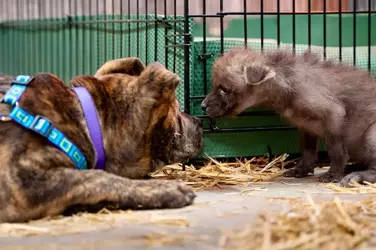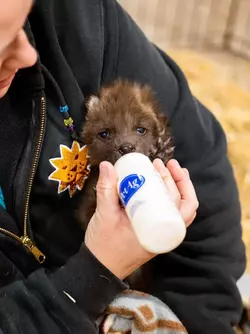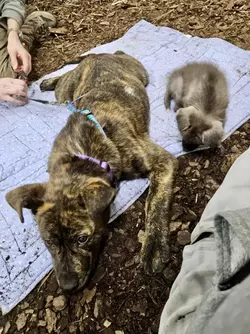[ Original | Archive ] By Caitlin McCormack
An orphaned wolf pup at a Kansas zoo gained a new family in a young dog coincidentally taken in by a local shelter on the same day the wolf was born.
The Sedgwick County Zoo and Kansas Humane Society banded together to unite kinless Amora the wolf and Slinky the brindle mix.

An orphaned wolf was united with a shelter dog to help them socialize and find their homes.
Kansas Humane Society
The zoo’s female maned wolf, Layla, passed away unexpectedly after giving birth to Amora. Even though wolves are typically solitary creatures, social connection is particularly pivotal for early development in pups, the KHS shared on its Facebook account Tuesday.

Slinky the dog and Amora the wolf became fast friends.
Kansas Humane Society

The wolf pup Amora unfortunately lost her mom.
Kansas Humane Society
To make Amora a not-so-lone wolf, the zoo turned to the KHS to adopt a pup in need of a home.
Coincidentally, Slinky’s sister had recently been adopted, leaving the 3-month-old down in the dumps. Matching him with Amora helped lessen both their woes.
“They have since been carefully introduced, and while Amora has quite the spicy personality, Slinky’s playful nature is helping her grow into the wolf she is meant to be,” the Sedgwick County Zoo explained.
Amora and Slinky are set to remain together until the wolf pup matures. When she does, she’ll be sent off to live with other maned wolves.

When Amora is mature, she will be sent to live with other wolves.
Kansas Humane Society
Even when their time together is up, Slinky won’t be left in limbo. The zoo staff have already fallen in love with him and an employee plans on adopting him once he and Amora are ready to part ways.
Placing animals in captivity with dogs for companionship is standard practice for some species, like cheetahs.

Though normally solitary animals, wolves do need social connect in their early development.
Kansas Humane Society

Following his stay with Amora, Slinky will be adopted by an employee of the Sedgwick County Zoo.
Kansas Humane Society
At zoos like the Cincinnati Zoo, adopted shelter dogs live with the resident cheetahs to keep them company. The fastest animals on the planet are actually gentle souls and greatly benefit from having their own emotional support companions, often found in breeds like labradors.
At the Richmond Metro Zoo, Kumbali the cheetah has lived with Kago the labrador for nearly a decade. The two share an enclosure overlooking the hippo habitat, currently home to Poppy the pygmy hippo and her family, during the day. Ever the fierce friend, Kago can often be found standing guard closest to the glass window visitors flock near to look into the enclosure.
An orphaned wolf pup at a Kansas zoo gained a new family in a young dog coincidentally taken in by a local shelter on the same day the wolf was born.
The Sedgwick County Zoo and Kansas Humane Society banded together to unite kinless Amora the wolf and Slinky the brindle mix.

An orphaned wolf was united with a shelter dog to help them socialize and find their homes.
Kansas Humane Society
The zoo’s female maned wolf, Layla, passed away unexpectedly after giving birth to Amora. Even though wolves are typically solitary creatures, social connection is particularly pivotal for early development in pups, the KHS shared on its Facebook account Tuesday.

Slinky the dog and Amora the wolf became fast friends.
Kansas Humane Society

The wolf pup Amora unfortunately lost her mom.
Kansas Humane Society
To make Amora a not-so-lone wolf, the zoo turned to the KHS to adopt a pup in need of a home.
Coincidentally, Slinky’s sister had recently been adopted, leaving the 3-month-old down in the dumps. Matching him with Amora helped lessen both their woes.
“They have since been carefully introduced, and while Amora has quite the spicy personality, Slinky’s playful nature is helping her grow into the wolf she is meant to be,” the Sedgwick County Zoo explained.
Amora and Slinky are set to remain together until the wolf pup matures. When she does, she’ll be sent off to live with other maned wolves.

When Amora is mature, she will be sent to live with other wolves.
Kansas Humane Society
Even when their time together is up, Slinky won’t be left in limbo. The zoo staff have already fallen in love with him and an employee plans on adopting him once he and Amora are ready to part ways.
Placing animals in captivity with dogs for companionship is standard practice for some species, like cheetahs.

Though normally solitary animals, wolves do need social connect in their early development.
Kansas Humane Society

Following his stay with Amora, Slinky will be adopted by an employee of the Sedgwick County Zoo.
Kansas Humane Society
At zoos like the Cincinnati Zoo, adopted shelter dogs live with the resident cheetahs to keep them company. The fastest animals on the planet are actually gentle souls and greatly benefit from having their own emotional support companions, often found in breeds like labradors.
At the Richmond Metro Zoo, Kumbali the cheetah has lived with Kago the labrador for nearly a decade. The two share an enclosure overlooking the hippo habitat, currently home to Poppy the pygmy hippo and her family, during the day. Ever the fierce friend, Kago can often be found standing guard closest to the glass window visitors flock near to look into the enclosure.


